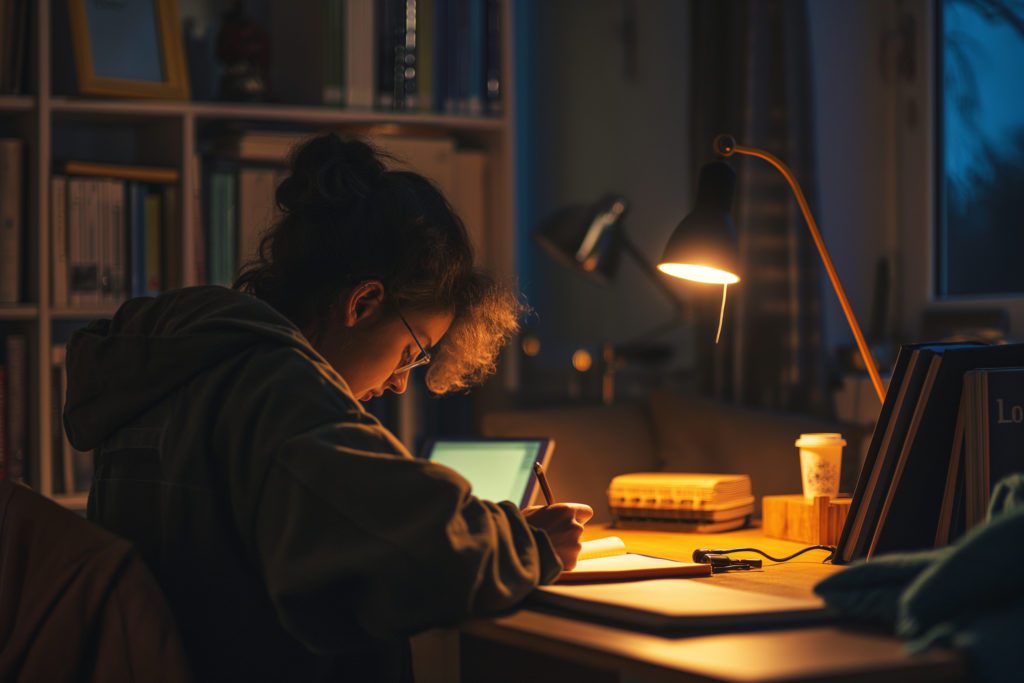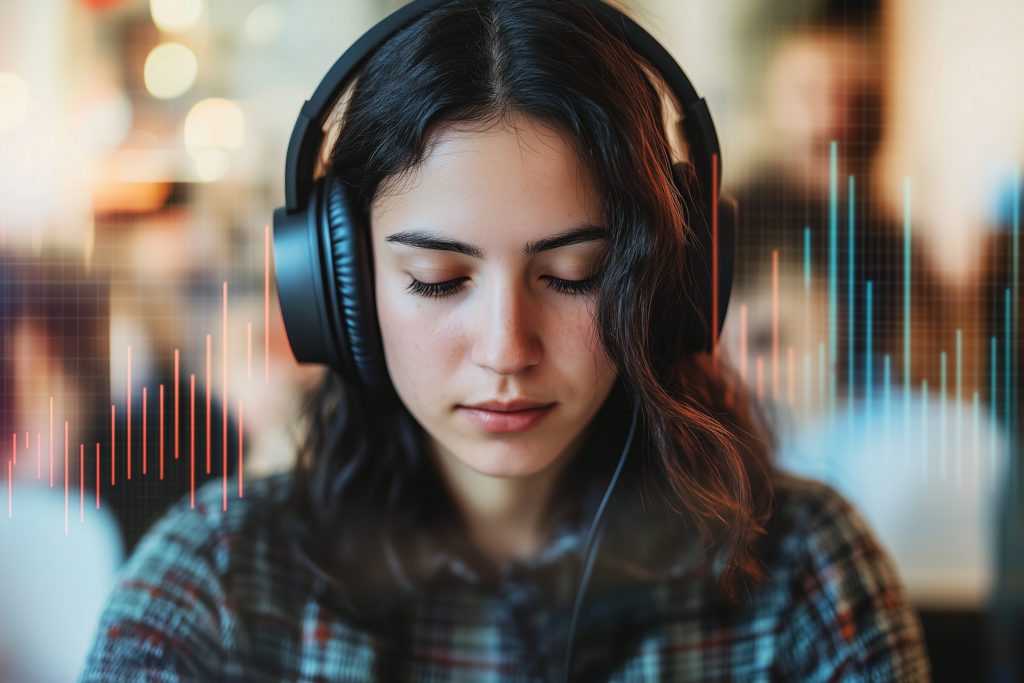
Sleep and Academic Stress
Learn how academic stress can influence your sleep and why sleep is crucial for students. Gain tips on lowering academic stress and improving sleep.

Is school keeping you up at night? Maybe you’re tossing and turning while thinking about all the work you have to do, or perhaps you’ve foregone sleep entirely in favor of pulling an all-nighter to get everything done. Whatever your relationship between sleep and school, academic stress can undoubtedly diminish your sleep.
Unfortunately, the less sleep you get, the more stressed you’ll feel about school (and potentially the worse you’ll do in your classes). In this article, we’ll explore why this is, but don’t worry, we won’t leave you hanging—we also have tips for reducing your academic stress, getting more sleep, and ending this year on top.
How Does Academic Stress Influence Sleep?
School-related stress, also referred to as academic stress, can be a significant energy drain. Here’s how:
It Makes You Anxious
The number one side effect of academic stress is anxiety, with research showing that high levels of academic stress have a significant association with anxiety. Meaning: if you’re stressed out from school, it’s giving you anxiety (that may be about all areas of life, not just school). In addition to the effects of this mental health concern on your daily well-being, anxiety is also associated with poor sleep quality, meaning that the sleep you get isn’t truly restful.
So, if you have academic stress, the sleep you’re getting barely scratches the surface of giving you the rest and rejuvenation you need to tackle another day of school work. The less energy you have and the harder it is to concentrate, the more stressed you’ll get about your schoolwork, and the cycle continues.
It Makes Falling Asleep Harder
Insomnia is a common companion to stress, as your thoughts can take center stage the second you lay down in bed. Maybe you’re thinking about a test you took or an upcoming presentation—whatever your thoughts, the stress associated with them can cause your heart and breathing rate to pick up, making sleep nearly impossible to fall into.
It Makes Your Sleep Times Irregular
Academic stress can keep you up at night. Sometimes, you may be unable to sleep because of the stress, whereas other times, you may need to stay up to finish an assignment due at midnight. Either scenario causes irregularities in when you go to sleep, which messes with your circadian rhythm, or your body’s internal clock that influences your sleep-wake times. The more irregular your circadian rhythm, the harder sleep is to come by, meaning just one sleepless night can impact your sleep for days to come.
It Keeps You from Sleeping (At All)
Have you ever had too much to do and not enough time to do it? This is a common situation for those with high workloads and extracurricular activities or jobs that leave little time to do their schoolwork. If your work builds and builds, you may soon be foregoing sleep just to get everything done.
Why Sleep Is Important for Students
Sleep is undoubtedly important for everyone, but students, in particular, need to prioritize their time in dreamland. This is because poor sleep is not only associated with mental health concerns such as depression and anxiety, but it can also cause poor academic performance.
This is because sleep is a significant part of your academic well-being. While sleeping, your brain processes the information it stores during the day, saving what it deems important. This means that, without enough sleep, you may not remember what you spent the day learning, leaving you back at ground zero.
Furthermore, focusing on schoolwork can seem impossible when you’re tired. This is because, when you’re exhausted, the cells in your brain do not process their signals as quickly, leaving you lagging as you try to concentrate.
Finally, poor sleep has been associated with lower mental health, with depression and anxiety common among those who are stressed and sleep-deprived. These feelings can weigh on your ability to believe in your ability to complete your schoolwork, which can cause more feelings of stress.
How to Get More Sleep as A Student
Academic stress causes poor sleep, but poor sleep can also increase stress levels. To stop the cycle, break either one; you may find that the other works itself out on its own.
The following are some tips for reducing academic stress and getting more sleep. Try implementing them and see the difference they make in your life.
Create (and Follow) a Bedtime Routine
Your routine before bed sets the tone for your night, so make sure it’s relaxing and low-energy. Put away the electronics for at least an hour before sleep to limit your exposure to blue light (which suppresses melatonin secretion and can keep you awake). Listen to some soothing music, take a warm shower, or even read a book. Unplugged and relaxing activities are key for your routine, and be sure to follow it every day and ideally around the same time.
Plan Out Tomorrow
Instead of letting your tasks for tomorrow ricochet in your mind, get them onto paper. This way, when you lie down, you don’t have to worry about everything you need to do because it’s already planned out. Additionally, once you write everything out and plan your day, things may no longer seem so overwhelming.
Power nap, but only when necessary
Naps are kryptonite for students. They’re appealing for the fatigued academic but often span too long, leaving you stressed about their time-sucking ways (and they usually leave you feeling worse when you wake up). Instead, if you need a nap, keep it to 20 minutes. This way, you get an energy boost without succumbing to sleep inertia.
School can be overwhelming, but these tips will help you improve your sleep while lessening your academic stress. Just wait; once you get enough sleep, you’ll be amazed by how much more manageable your workload seems and how capable you are of handling whatever school throws your way.
For more tips on improving your health and wellness through sleep, visit Pillow’s resource library.
FAQ
Will pulling an all-nighter affect me?
Yes, pulling an all-nighter can have several negative effects. It reduces cognitive function, impairs memory retention, and decreases focus, making it harder to perform well on exams or assignments. Sleep deprivation also weakens your immune system and increases stress levels, making you feel worse overall. Even a few hours of sleep is better than none!
How does lack of sleep affect memory and learning?
Sleep is essential for memory consolidation, the process by which your brain strengthens and organizes information learned during the day. Without adequate sleep, students may struggle to retain information, leading to difficulties in recalling key concepts during exams or assignments.
What are some effective relaxation techniques for students struggling to fall asleep?
Students experiencing academic stress may benefit from relaxation techniques such as deep breathing exercises, progressive muscle relaxation, guided meditation, or journaling before bed. These methods help calm the mind and prepare the body for sleep.
Can stress dreams or nightmares be caused by academic pressure?
Yes! Stress and anxiety from school can lead to vivid dreams or nightmares about academic-related situations, such as failing a test or forgetting an assignment. Practicing relaxation techniques before bed can help reduce these stress-induced dreams.
What are the long-term consequences of chronic sleep deprivation in students?
Consistently missing out on sleep can lead to increased risks of anxiety, depression, weakened immune function, and long-term cognitive decline. Poor sleep habits in school can also set the stage for lifelong sleep issues.

Written by
Jessica G
Medical writer freelancer who has written hundreds of articles on varying topics. Masters of Engineering degree in Biomedical Engineering.
Download Pillow
Get help
Press & News
Legal
Connect
X (Twitter)
Company
Copyright © Neybox Digital Ltd.



